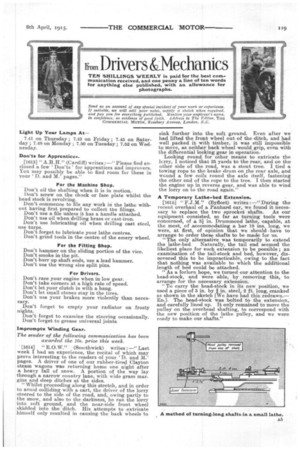Fr 0 m Drivers &Mechanics
Page 19

If you've noticed an error in this article please click here to report it so we can fix it.
TEN SHILLINGS WEEKLY is paid for the best communication received, and one penny a line of ten words for anything else published, with an allowance for photographs.
Light Up Your Lamps At 7•41 on Thursday ; 7.43 on Friday ; 7.45 on Saturday; 7.48 on Monday ; 7.50 on Tuesday ; 7.52 on Wednesday.
Don'ts for Apprentices.
[1613] " A.TI.H." (Cardiff) writes :—" Please find enclosed a few ' Don'ts ' for apprentices and improvers. You may possibly be able to find room for these in your '11 and M.' pages."
For the Machine Shop.
Don't oil the shafting when it is in motion. Don't screw on the chuck or face plate whilst the head stock is revolving. Don't commence to file any work in the lathe with
out having first prepared to collect the filings. Don't use a file unless it has a handle attached. Don't use oil when drilling brass or cast-iron. Don't use lubricating oil when drilling cast steel,
use turps.
Don't forget to lubricate your lathe centres. Don't grind tools in the centre of the emery wheel.
For the Fitting Shop,
Don't Don't Don't Don't hammer on the sliding portion of the vice. smoke in the pit. burr up shaft ends, use a lead hammer. use the wrong size split pins.
For Drivers.
Don't race your engine when in low gear. Don't take corners at a high rate of speed. Don't let your clutch in with a bang.
Don't let small stones stay in the tires.
Don't use your brakes more violently than neces sary.
Don't forget to empty your radiator on frosty nights.
Don't forget to examine the steering occasionally. Don't forget to grease universal joints.
Impromptu Winding Gear.
The sender of the following communication has been awarded the Ws. prize this week.
(1614] " E.O.W." • (Smethwick) writes :—" Last week I had an experience, the recital of which may prove interesting to the readers of your D. and M. pages. A driver of one of our rubber-tired Clayton steam wagons was returning home one night after a heavy fall of snow. A portion of the way lay through a narrow country lane, with wide grass margins and deep ditches at the sides.
"Whilst proceeding along this stretch, and in order to avoid colliding with a cart, the driver of the lorry steered to the side of the road, and, owing partly to the snow, and also to the darkness, he ran the lorry into soft ground, and the near-side front wheel skidded into the ditch. His attempts to extricate himself only resulted in causing the back wheels to sink further into the soft ground. Even after we had lifted the front wheel out of the ditch, and had well packed it with timber, it was still impossible to move, as neither back wheel would grip, even with the differential locking gear in operation.
Looking round for other means to extricate the lcrry, I noticed that 25 yards to the rear, and on the other side of the road, was a stout tree. I tied a towing rope to the brake drum on :the rear axle, and wound a few coils round the axle itself, fastening the other end of the rope to the tree. I then started the engine up in reverse gear, and was able to wind the lorry on to the road again."
A Temporary Lathe-bed Extension. • [1615] " F.j.M." (Byfleet) writes :—" During the recent overhaul of a Panhard car, we found it necessary to replace the two sprocket shafts. As our equipment consisted, so far as turning tools were concerned, of a 34 in. Drummond lathe., capable, at the most, of accommodating a. bar 18 ins. long, we were, at first, of opinion that we should have to arrange to order these shafts to be made for us.
"The only alternative was temporarily to extend the lathe-bed. Naturally, the tail end seemed the likeliest place for such extension to be possible ; an examination of the tail-stock and bed, however, discovered this to be impracticable, owing to the fact that nothing was available to which the additional
length of bed could be attached.
.As a forlorn hope, we turned our attention to the head-stock, and were able, by removing this, to arrange for the necessary extension.
" To carry the head-stock in its new position, we used a piece of 3 in. by in. steel, 2 ft. long, cranked as shown in the sketch [We have had this redrawn.— ED.]. The head-stock was bolted to the extension, and carefully lined up. It only remained to move the pulley on the overhead shafting, to correspond with the new position of the lathe pulley, and we were ready to make our shafts."




















